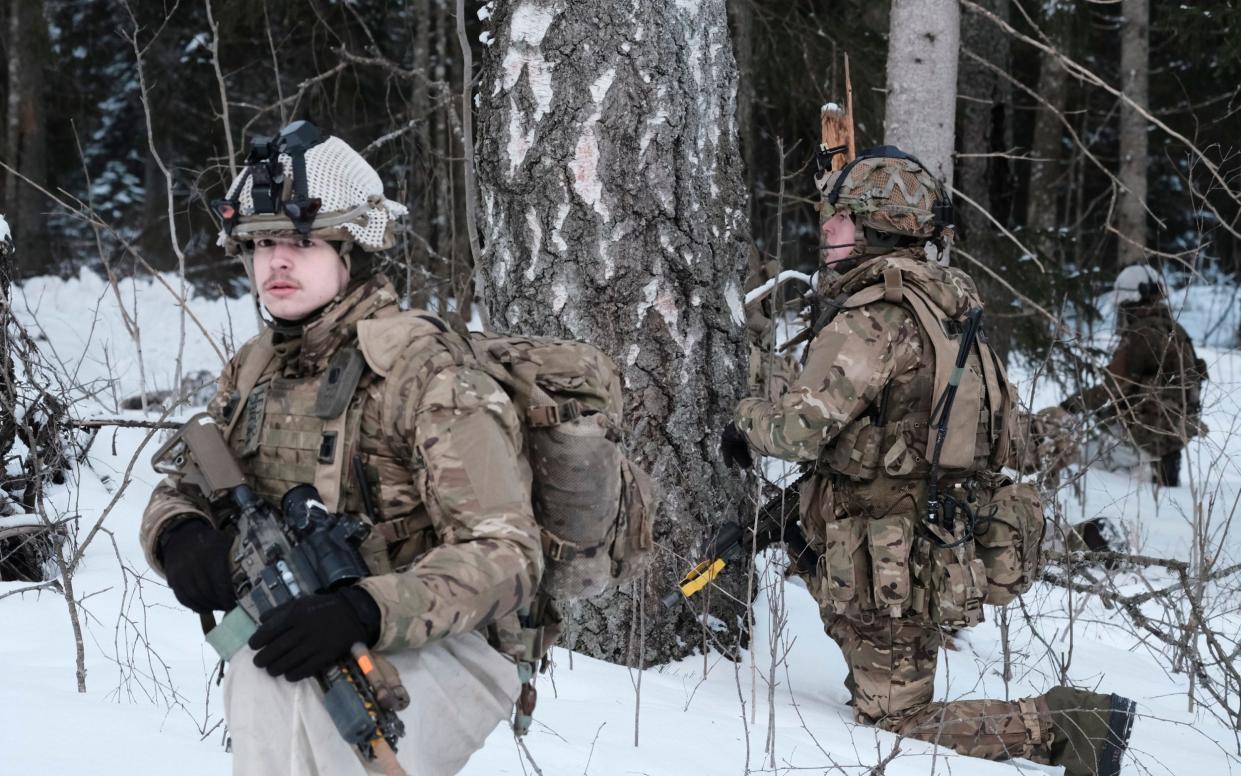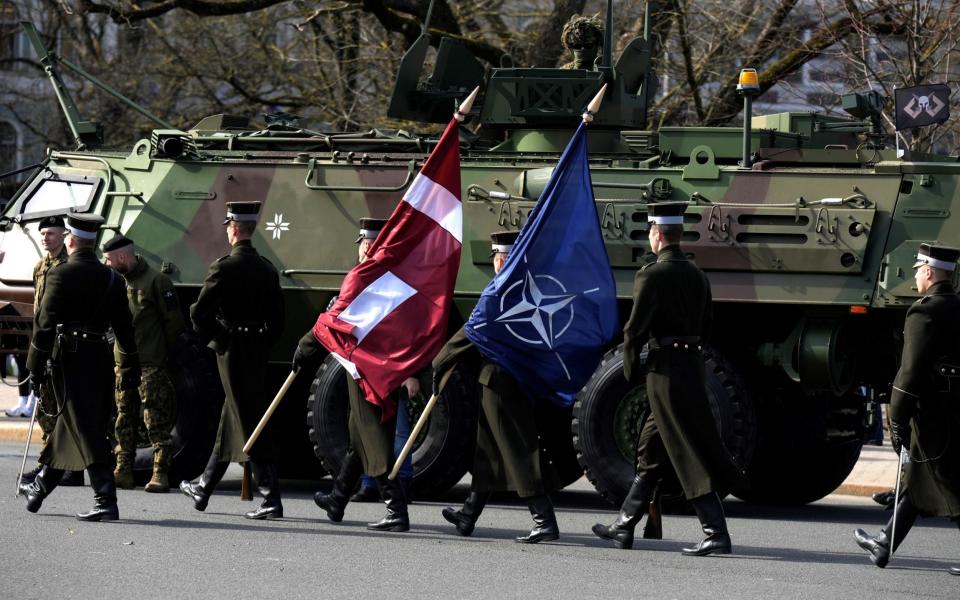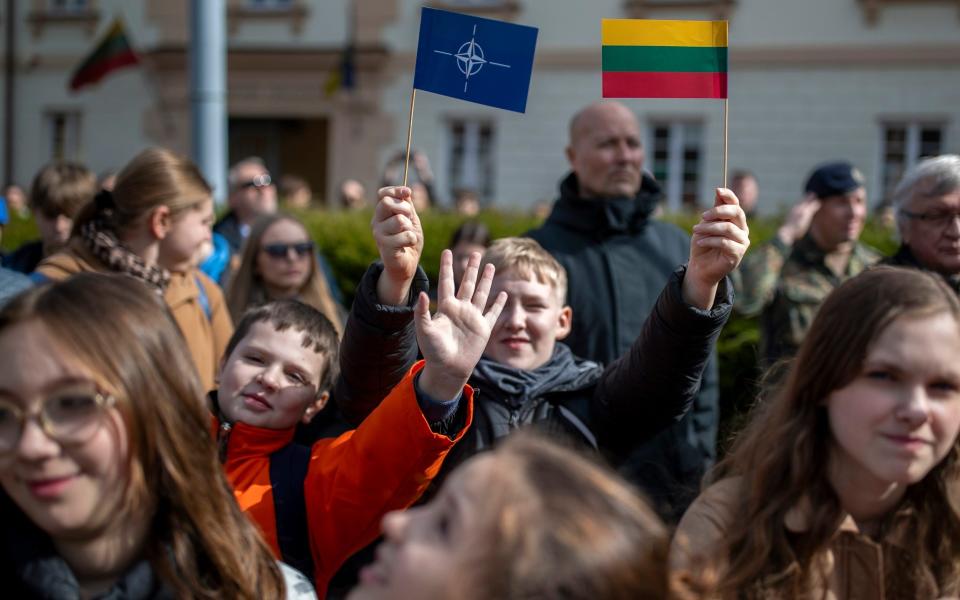Prepare for Putin pivot to invade us, say Baltic states

- Oops!Something went wrong.Please try again later.
Nato must be ready for Russia launching an “existential” war against the Baltic states “masked by a blizzard of disinformation”, ambassadors from the three countries have warned.
Writing exclusively for The Sunday Telegraph, the top diplomats to the UK from Estonia, Latvia and Lithuania said that Russia could “pivot quickly” from Ukraine to invade the Baltic.
And they said that Vladimir Putin’s brutalisation of Ukraine is evoking the three countries’ “darkest memories” of occupation under Stalin.
The Estonian ambassador Viljar Lubi, the Latvian ambassador Ivita Burmistre, and Lithuania’s charge d’affaire Lina Zigmantaite, wrote the joint article to mark Friday’s 20 year anniversary of their countries acceding to Nato.
The ambassadors said that joining the alliance meant that their nations had never enjoyed “stronger collective security” than today, but “nor have we faced a more daunting threat”.
In a swipe at other European countries who had played down the risk of Russia, they said: “Our warnings about the latent and growing threat from the East were too easily dismissed in some allied capitals.
“We knew then just as we know today that only a collective defence can guarantee security in Europe. We lacked this in the 1930s and paid a heavy price; one that Ukrainians are paying now.”

The ambassadors said that the “torments” currently being experienced by Ukraine in the form of “deportation, torture, kidnap of children” and “cultural erasure” awakened their countries’ “own darkest memories and fears” - an apparent reference to the Soviet occupation of the Baltic states which began in 1940.
Warning that Russia could once again seek to invade, they said: “We are acutely aware that Russia’s war economy and battle-hardened military can pivot quickly from south to west.
“We agree with intelligence assessments that a sharp strategic challenge to our defence and deterrence could come in as little as three years or even less. We on the east side of the Baltic Sea have few natural frontiers, and nowhere to retreat to.”
With the countries already assailed by “hybrid attacks” such as cyber warfare “on a daily basis”, they warned that an “existential challenge” to their independence “may initially seem ambiguous, masked by a blizzard of disinformation and other distractions”.
“In these circumstances, confusion spells defeat. We - and our allies - need therefore to be ready to respond quickly, convincingly and effectively to all kinds of threats.”
To deter Russia, they called for “speedier decision-making” in Nato and for all members “to invest in the forces and equipment to make the alliance’s new defence plans a reality”.
The ambassadors said the “frontline” Baltic states are “raising our game, ready to fight to defend every inch and every soul” and “Nato must do the same”. They also said that Nato leadership needs a “strong” UK.
On Ukraine, they said Russia must “not be allowed to win”. The ambassadors said that Ukranian accession to Nato at a future date would not only protect the country from further Russian aggression, but would strengthen the alliance because “as a battle-hardened ally, Ukraine will be a heavyweight contributor to our security”.

They added: “A clear path for Ukrainian membership must be a priority for the alliance’s 75th anniversary Summit in Washington this summer.”
The ambassadors’ intervention comes at a time of growing concern about Ukraine’s ability to keep resisting Russia and uncertainty about Nato’s future.
A $60billion (£45.9bn) package of American military aid for Ukraine remains stuck in Congress. At the same time, Nato members are scrambling to prepare for the possible re-election of Donald Trump, who has previously flirted with the idea of withdrawing from the alliance.
The diplomats’ reference to a “strong” UK and the need to “invest” is likely to be interpreted as a call for Britain to increase its defence spending.
The Government has received criticism from its own MPs in recent weeks for not finding extra money for the Armed Forces in the Budget.
Britain currently spends about 2 per cent of GDP on its military, but three former Tory defence secretaries have said that a commitment to 3 per cent should be in the election manifesto - an idea supported by the incumbent, Grant Shapps.
In an interview with The Telegraph earlier this month Latvia’s foreign minister, Krišjānis Kariņš, urged Britain to consider following it in reintroducing conscription to deter Russia.

